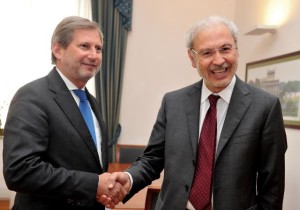There is only time until the end of the year to request funds that are still available
For Trigilia, Minister for Territorial Cohesion, our country “cannot lose a single Euro”
 There are still 31 billion Euro that need to be spent and 2 ½ years left to take advantage of them: in order for the EU funds still available from the 2007-2013 cycle not to be lost, Italy must react quickly. Precisely because of this requirement after 2 days of meetings in Rome, the Minister for Territorial Cohesion, Carlo Trigilia, and the EU Regional Policy Commissioner, Johannes Hahn agreed. There is time until December 2015 to spend the funds (on which the Italy’s co-partnership is actually fixed at 40%) but, because they fall under the 2007-2013 programs, the projects must be presented by the end of this year.
There are still 31 billion Euro that need to be spent and 2 ½ years left to take advantage of them: in order for the EU funds still available from the 2007-2013 cycle not to be lost, Italy must react quickly. Precisely because of this requirement after 2 days of meetings in Rome, the Minister for Territorial Cohesion, Carlo Trigilia, and the EU Regional Policy Commissioner, Johannes Hahn agreed. There is time until December 2015 to spend the funds (on which the Italy’s co-partnership is actually fixed at 40%) but, because they fall under the 2007-2013 programs, the projects must be presented by the end of this year.
“The picture remains grim: we cannot allow ourselves to lose a single Euro given our country’s situation” stressed Trigilia. The minister also highlighted the need to avoid a “heavy overlap between the end of the old (2007-2013) and the beginning of the new cycle (2014-2020).” Due to this the Ministry technicians are working on tight deadlines. Shortly, by the end of July, a census of the programs will be carried out “to identify those with the highest risk of losing financing” in order to convert resources to more easily obtainable objectives.
To obtain the result, Trigilia and Hahn also announced that soon a task force will be made that will support the Calabria region in using EU funds in order to accelerate the implementation of ongoing programs. It will operate with a joint work plan between the EU Commission, Ministry of Economy, Ministry of Territorial Cohesion and regional administration. The decision was taken “after a series of meetings held with the governor of Calabria, Giuseppe Scopelliti,” to try to minimize the risk of losing money that, according to the Commissioner, is still real. The task force, he explained, will support the region, “like what was done with Campania and Sicily in the last months” in the process of certification of expenditure for 2015 in evaluating the feasibility of the projects and support for the preparation of requirements which will be more stringent in the next round of EU funds.
That’s not all. The idea of creating an agency with the task of supporting the administrations having difficulties managing programs and with a direct role in designing interventions was also mentioned. The new agency expects an active role in project management in the central government, focusing targets to prevent cases of ‘smashing.’ “It is necessary – said Hahn – a profound rethinking of the governance of the programs financed by the structural funds.” It is important, he also added to start a “virtuoso competition” between the territories thanks to the development of best practices.
Letizia Pascale


![Una donna controlla le informazioni sul cibo specificate sulla confezione [foto: archivio]](https://www.eunews.it/wp-content/uploads/2014/12/Etichette-alimentari.jpg)


![Ragazza in biblioteca. Nell'Ue chi studia non lavora e neppure cerca. In Italia funziona ancor più così [foto: Tulane University, Wikimedia Commons]](https://www.eunews.it/wp-content/uploads/2024/11/Girl_in_the_Library_3638661587-350x250.jpg)



